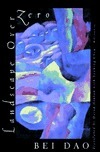What do you think?
Rate this book


Paperback
First published October 1, 1996
in the cold morningIt's been a long while since I last directly composed a review on the computer rather than transferring over from work time doodles, so if I ramble along for longer than usual, that's why. I almost held off on finishing this until I could do my review-while-work-is-slow ritual, but the end of year transition is making me antsy with its accompanying slow but sure changes and new opportunities, so I might as well break the mold and return to a more lackadaisical style of penning my thoughts down. In terms of this work itself, I honestly first noticed it because of its beautiful cover design, and upon flipping through it and finding bilingual spreads of intriguing flashes of rhetoric, I figured it was worth acquiring for the buck it was listed at. After completing it, I honestly can't say that I understood any of it, but considering how short it is and how beautifully the edition is put together and how it was put forth by New Directions and how the professor taught at my sister's alma mater, it appeals to me in a collection of discombobulated ways to the point that, it's short enough that I'd like to see it reach a wider audience. Now, you may ask, how likely is that to happen with experimental Chinese poetry on an Anglocentric platform. If I worried about such things any more than I had to, I'd never get anything done.
an awakened bird
comes closer to truth
as I and my poems
sink together
- February
novice eveningsThe ones I liked the most inevitable returned to the subject of poetry, as it's what I have the most experience with. I probably would have picked up on more had I delved into the author's wiki article involving the Cultural Revolution and exile (?) from China, but that, weirdly enough, felt too much like spoilers for me to refrain from doing so until just now. Thanks to the area of my upbringing, I'm pretty decent at differentiating Mandarin Chinese from Japanese and Korean and Vietnamese and Cantonese by ear and every so often visually in script, but I maybe know one (?) character of the pinyin (I'm assuming it's pinyin), if that, so unlike Textermination where I could maybe get one in three of the French and one in ten of the German, here I rested completely in the hands of the translation. Going back to the poetry thing, that's what I have the most experience with in terms of the fulfillment of artistic craftsmanship and the miracle that is the written world, so any time 'poetry' or 'poem' or even 'writing' showed up, I went into metaphor mode and thought about how I could apply the foxes and the paperweights and the pipe-organs to some semblance of interpretation. I'm sure the accuracy of the results is abysmal, but I'm content with some sections enough to transfer them here, and if it convinces people with far more experience with Mandarin text than me to give this a chance, I'll have done my job. So, lack of understanding definitely compromised my ability to appreciate this, but I can comprehend certain themes that I'm naturally predisposed to enough to think that Bei Dao is doing interesting work, and if this edition's backflap rumors of shortlists for the Nobel Prize prove substantial, I won't complain about the potential for a greatly enhanced translation market.
nothing to fear
they recite on rooftops in one voice
that page of wordless twilight
out on snowstorm debts
and the gasping of tired horses
they approach a site that's blooming
and out on that town square of age
they produce and schools of thought
use long whips to touch meanings
sow their names
along cracks in the concrete
- Novice
looking back a few times in the poem
night birds singing together
you set smoke drifting free
toward a place where song vanishes
walking into tomorrow beneath an umbrella
you, a wanderer
set out from your own end
what can replace joy
- Untitled